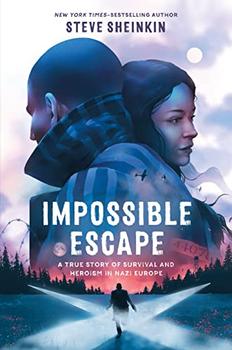Summary | Excerpt | Reviews | Beyond the Book | Readalikes | Genres & Themes | Author Bio

 Book Reviewed by:
Book Reviewed by:
Aditi Upadhyaya
Buy This Book
1
RUDI WOULD FIND A WAY to fight Adolf Hitler. It can be said, without risk of exaggeration, that he would go on to be—while still a teenager—one of the great heroes of the entire Second World War.
But not in a way he ever could have imagined.
Growing up in the Central European country of Czechoslovakia, Rudolf Vrba's life was pretty good. Pretty normal. He liked school, especially science. He and his friends—some Jewish, some Christian—went to movies and soccer matches.
Sure, Rudi was aware of Europe's long history of prejudice against Jews. He'd hear the occasional antisemitic joke in the market—someone would be bargaining with a merchant, and they'd say, "What are you? A Jew or a human?"
It was ignorant and cruel. But this too was normal. All part of life for a Jewish kid.
Rudi was aware of Adolf Hitler, of course. No one could avoid hearing about Hitler, the fascist leader in Germany with the little square mustache, ranting and raving about Jews, vowing to make Germany a great power again, demanding territory from neighbors, constantly threatening war. But this seemed far off. It didn't directly impact Rudi's world.
Until suddenly it did.
* * *
Born in Austria in 1889, Adolf Hitler fought for Germany in the First World War before jumping into extreme right-wing politics in his early thirties. Hitler and his Nazi Party competed in German elections throughout the 1920s and into the early 1930s. Even with Nazi thugs stalking the streets, intimidating voters and journalists, beating up political rivals, Hitler never won a majority of the national vote. But in a country badly divided between rival parties, he had one of the largest blocs of voters. He became chancellor of Germany in 1933, and from there moved quickly to seize the powers of a dictator.
Hitler banned other political parties. He shut down opposition newspapers. Less than two months after taking power, the Nazis established their first concentration camp, Dachau, in an old factory outside of Munich. Other camps followed: Sachsenhausen, Buchenwald, and Ravensbrück, where women were imprisoned. The Nazis used these camps to terrorize anyone deemed an "enemy of the state," anyone who didn't fit Hitler's vision of German society—a long list that included union leaders, communists, gay men, and Jews.
The camp system was run by Hitler's Schutzstaffel, or "protection squad"—known as the SS. The SS began as Hitler's private guard and expanded to a 250,000-member armed force that obeyed no rule of law other than the orders of the German dictator.
All the while, Hitler hammered away at what he called the "Jewish question" and the "Jewish problem." He relentlessly attacked Jews as "subhuman," comparing them to a contagious disease, labeling them an inferior race with no place in Germany's future. He blamed Jews for Germany's loss in the First World War, for its economic hardships, for everything.
This was plainly preposterous. Jewish Germans, who made up less than 1 percent of the country's population, had fought and died in World War I at the same rate as non-Jews. Jewish scientists, including Albert Einstein, had brought ten Nobel Prizes home to Germany in the quarter century before Hitler took power.
But Hitler's rants were never meant to be logical. The goal was to unite a large group of people by turning them against a smaller, more vulnerable group. A typical tactic of tyrants.
With absolute power in his hands, Hitler stripped German Jews of their citizenship and rights. Jewish professors were banned from teaching. German universities started teaching absurd "racial science," which conveniently concluded that Germans were a "master race" and destined to build an empire in Europe.
In the late 1930s, Adolf Hitler began following through on his vow to expand Germany's borders. Hitler annexed Austria in 1938, then demanded that a huge part of Czechoslovakia come under German rule. France and Great Britain had the military strength to stop Hitler. But this was just twenty years after the end of the First World War, which had devastated an entire generation of young men. Unwilling to face the horrors of another European war, French and British leaders caved in to Hitler's demands. In early 1939, Hitler seized the Czech side of what had been Czechoslovakia.
Excerpted from Impossible Escape by Steve Sheinkin. Copyright © 2023 by Steve Sheinkin. Excerpted by permission of Roaring Brook Press. All rights reserved. No part of this excerpt may be reproduced or reprinted without permission in writing from the publisher.




Everywhere I go, I am asked if I think the university stifles writers...
Click Here to find out who said this, as well as discovering other famous literary quotes!
Your guide toexceptional books
BookBrowse seeks out and recommends the best in contemporary fiction and nonfiction—books that not only engage and entertain but also deepen our understanding of ourselves and the world around us.